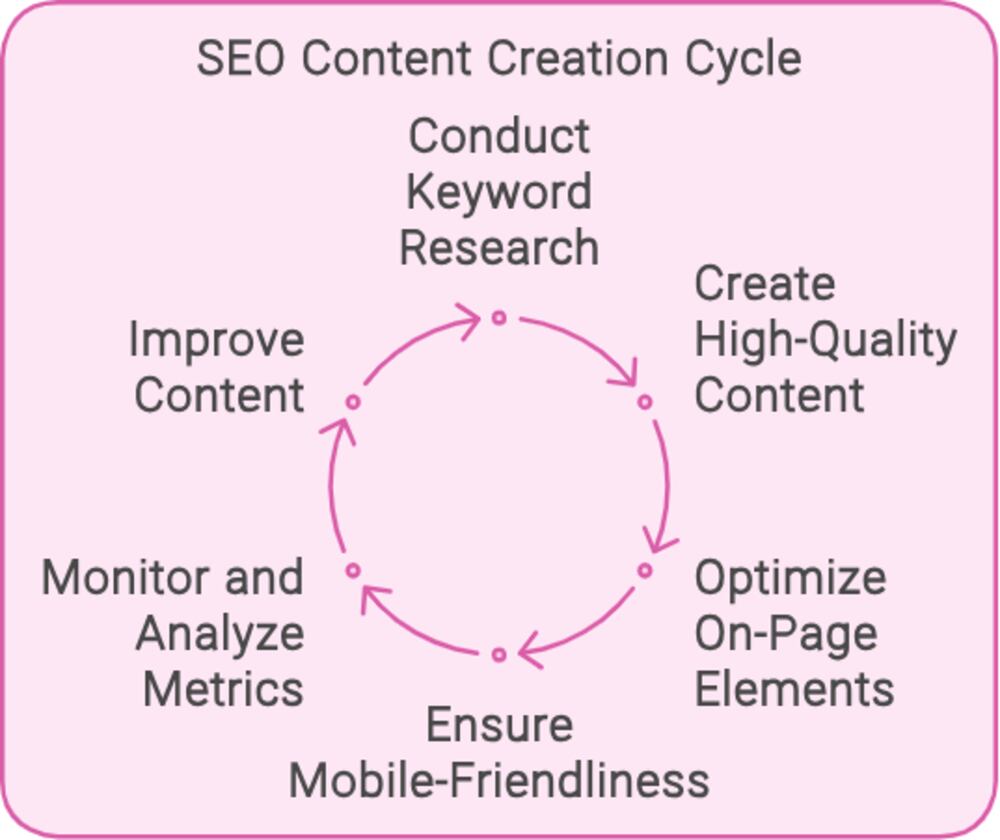How a Customer Engagement Platform Can Transform Your Marketing Strategy
See how a customer engagement platform can transform your marketing strategy with better personalization & interaction.

Content marketing serves as the backbone of successful SEO (Search Engine Optimization) campaigns. By generating and distributing valuable, relevant, and consistent content, businesses can effectively engage their audience and drive organic traffic to their websites.
Content marketing serves as the backbone of successful SEO (Search Engine Optimization) campaigns. By generating and distributing valuable, relevant, and consistent content, businesses can effectively engage their audience and drive organic traffic to their websites.
Content marketing is a strategic approach that focuses on creating and sharing valuable content to attract and retain a clearly defined target audience.
Unlike traditional outbound marketing methods that interrupt potential customers with advertisements or promotions, content marketing takes an inbound approach by providing useful information that aligns with customers’ needs and interests. This customer-centric approach fosters trust and loyalty while positioning the brand as an authoritative source within its industry.
The symbiotic relationship between content marketing and SEO is undeniable. As search engines have become smarter over the years, they prioritize high-quality, relevant content in their ranking algorithms.
when keyword stuffing alone could propel a website to higher search engine rankings. Today, search engines measure website authority based on factors such as backlinks from reputable sources, user engagement metrics like time spent on site and bounce rates, and social shares – all of which can be enhanced through effective content marketing practices.
Moreover, by incorporating keywords strategically within well-crafted content pieces aligned with users’ search intent, businesses can optimize their website’s visibility on search engine results pages (SERPs).
This organic traffic not only brings potential customers directly to your website but also increases brand awareness among those searching for products or services related to your industry.
To achieve optimal results from their SEO efforts, businesses must develop a robust content marketing strategy that aligns with their overall goals. This entails understanding customer preferences through research using various analytical tools such as Google Analytics or other specialized software designed specifically for tracking key performance indicators (KPIs) related to content marketing.
By assessing metrics such as website traffic, customer engagement, and lead generation, businesses can gauge the effectiveness of their content marketing efforts and refine their strategies accordingly.
In this article, we will delve deeper into how content marketing can help businesses rank higher in search engines. We will explore techniques for creating SEO-optimized content that resonates with target audiences and examine strategies for promoting content to improve SEO rankings.
Through real-world case studies and best practices, we will highlight the symbiotic relationship between content marketing and SEO while providing insights into current trends shaping the future of this dynamic field.

Content marketing is a strategic marketing approach that involves the creation and distribution of valuable, relevant, and consistent content to attract and engage a specific target audience.
Unlike traditional advertising methods focused on selling products or services directly, content marketing aims to provide value to consumers by offering informative, entertaining, or educational content. This content can take various forms, such as blog posts, articles, videos, infographics, podcasts, and social media posts.
The primary goal of content marketing is not only to generate leads and drive traffic to a website but also to build brand awareness and establish credibility in the industry. By consistently delivering high-quality content that addresses the needs and interests of their target audience, businesses can position themselves as thought leaders and trusted sources of information.
This helps foster customer loyalty while attracting new prospects who are more likely to engage with the brand. To implement an effective content marketing strategy, businesses must develop a well-defined content marketing plan that aligns with their overall marketing goals.
The content marketing efforts identify the target audience for each piece of content created. Additionally, businesses should allocate a realistic budget for their content marketing initiatives as it often requires investment in resources such as talented writers or designers and may involve leveraging various tools for planning, creation, distribution, and analysis.
Successful execution of a content marketing strategy relies on thorough research and understanding of both the target audience’s preferences and industry trends. By identifying relevant keywords related to their products or services through search engine optimization (SEO) research tools like Google Keyword Planner or SEMrush, businesses can optimize their website’s organic traffic potential.
Integrating these keywords into the titles, headings, and body copy will increase the chances of ranking higher in search engine results pages (SERPs), thus driving more qualified traffic. investing in well-crafted and targeted content plays a vital role in enhancing brand visibility online by optimizing SEO efforts. Through content marketing, businesses can engage customers and prospects alike, fostering loyalty and generating leads.
Content marketing is a strategic approach that involves creating and distributing valuable, relevant, and consistent content to attract and engage a clearly defined target audience. It aims to educate, entertain, or inspire consumers rather than directly promoting a product or service.
By providing valuable information or entertainment through various channels such as blogs, social media, videos, podcasts, and more, content marketing seeks to establish trust and build relationships with potential customers.
One of the fundamental principles of content marketing is that it focuses on delivering value to the audience. Instead of bombarding consumers with intrusive advertisements or sales pitches, content marketing aims to provide them with useful information that addresses their needs or solves their problems.
This value-driven approach aligns with the inbound marketing concept where businesses attract customers organically by offering valuable content rather than interrupting them with traditional advertising methods. To effectively implement content marketing, it is important to develop a well-thought-out strategy that aligns with business goals and target audience preferences.
This involves conducting thorough research to understand the needs and interests of the target audience, identifying suitable platforms for content distribution, creating high-quality content using appropriate formats (such as articles, ebooks, and infographics), and optimizing it for search engines (SEO).
Measuring key performance indicators (KPIs) such as website traffic, engagement metrics (like time spent on a page or social shares), lead generation success rate, customer loyalty indicators (such as repeat purchases), and brand awareness metrics can help evaluate the effectiveness of a content marketing campaign.
Content marketing operates by creating valuable and relevant content tailored towards attracting potential customers rather than directly promoting products or services. By adopting this strategy effectively through careful planning and execution based on research insights, content marketers can successfully engage their target audiences, gain website traffic, and ultimately drive business growth

Content marketing is pivotal in enhancing search engine optimization (SEO) efforts.
Organic traffic is highly coveted, and businesses and brands must recognize the importance of content marketing as a powerful tool to improve their SEO rankings. Let’s delve into the reasons why content marketing and SEO are intrinsically linked.
Firstly, creating high-quality and relevant content is essential for attracting organic traffic to your website. Search engines are continuously evolving to provide users with the most valuable and engaging content.
By consistently producing well-optimized, informative articles or blog posts, you can enhance your website’s visibility in search engine results pages (SERPs). A robust content marketing strategy allows you to incorporate target keywords naturally throughout your website, signaling to search engines that your site offers authoritative information related to specific topics or industries.
Secondly, content marketing fosters brand awareness and customer engagement. When you produce compelling content that resonates with your target audience, it not only drives traffic but also encourages social sharing and inbound links from other reputable websites. This amplifies your online presence and establishes your brand as an industry thought leader.
By providing valuable insights through informative articles or multimedia assets, you can nurture customer loyalty and build trust with your audience. Numerous case studies have demonstrated how companies have achieved remarkable success by integrating a well-executed content marketing plan into their SEO strategies.
For example, a leading e-commerce company increased website traffic by 150% within six months through consistent blogging efforts and effective keyword optimization techniques. Similarly, a B2B software provider achieved significant lead generation growth by developing insightful whitepapers and videos that provided solutions to industry pain points.
Beyond being an effective way to engage audiences and foster brand awareness, content marketing is crucial for enhancing SEO efforts due to its ability to boost organic traffic through optimized keyword placement within high-quality content.
By integrating a well-thought-out content marketing strategy into your overall SEO plan, you can improve your website’s visibility in search engine results, increase customer engagement and loyalty, and ultimately drive more organic traffic and leads to your business.
As the future of content marketing unfolds, businesses should continue to prioritize and invest in this powerful approach to stay ahead of the competition and tap into the ever-growing potential of organic traffic.
One of the key benefits of content marketing for SEO is its ability to help you rank higher in search engines. By creating high-quality, relevant, and optimized content, you can improve your website’s visibility and increase your chances of appearing on the first page of search engine results.
Content marketing allows you to target specific keywords and phrases that are relevant to your business or industry. By conducting keyword research and incorporating these terms strategically into your content, you can optimize it for search engines. This enables search engine crawlers to understand the context and relevance of your content, increasing its chances of ranking higher in organic search results.
Content marketing can generate organic traffic to your website. When users find valuable information or solutions through your content, they are more likely to visit other pages on your site, increasing overall website traffic.
This increased traffic sends positive signals to search engines about the quality and relevance of your site’s content, which can result in improved rankings. Content marketing contributes to building brand awareness and customer engagement.
Well-crafted blog posts, articles, videos, or social media updates have the potential to resonate with your target audience and establish you as an authority in your industry. When users perceive value in your content and find it useful or entertaining, they are more likely to share it with others through social media or link back to it from their websites.
These social signals not only drive more traffic but also enhance brand visibility and credibility in the eyes of both users and search engines. Leveraging content marketing as part of a comprehensive SEO strategy is crucial for businesses seeking greater online visibility.

Creating high-quality optimized and engaging content helps to improve website rankings by targeting keywords generating organic traffic and promoting brand awareness. By staying updated with content marketing trends best practices and using relevant content marketing tools organizations can build customer loyalty, generate leads, and achieve long-term success in the digital landscape.
Creating content that is optimized for SEO is crucial for driving organic traffic to your website and improving your search engine rankings. By following these best practices, you can ensure that your content is well-positioned to attract more visitors and generate valuable leads. It is important to conduct thorough keyword research before creating any content.
Keyword research involves identifying the terms and phrases your target audience is searching for about your business or industry. By strategically incorporating these keywords into your content, search engines will better understand the relevance of your website and rank it higher in search results. Tools such as Google Keyword Planner or SEMrush can assist you in finding relevant keywords to target.

It’s crucial to create high-quality, informative, and engaging content that meets the needs of your audience. This includes writing compelling headlines that grab attention, using subheadings to break up text for easy readability, and incorporating visuals such as images or videos.
Quality content not only attracts readers but also encourages them to share it with others, increasing brand awareness and generating inbound links that contribute positively to SEO ranking factors. Furthermore, optimizing on-page elements such as meta titles, meta descriptions, and URL structures can significantly improve the visibility of your content in search results.
Including relevant keywords in these elements helps search engines determine the topic of your page more accurately. Moreover, make sure to use descriptive alt tags for images so they are properly indexed by search engines.
Another important aspect of creating SEO-optimized content is ensuring its mobile-friendliness. With more people accessing the internet through their mobile devices today than ever before, having a responsive design is essential for a successful online presence.
Mobile-friendly websites not only provide a better user experience but also receive preferential treatment from search engines when delivering results on mobile devices. Regularly monitoring and analyzing key metrics such as website traffic sources (organic vs. paid), bounce rates, time spent on the page, and conversion rates can help you measure the effectiveness of your content marketing efforts.
Analyzing these metrics allows you to identify areas for improvement and make data-driven decisions to enhance your content marketing strategy. By implementing these practices, you can create content that is not only optimized for SEO but also resonates with your target audience, increasing customer engagement, and brand loyalty, and ultimately driving more organic traffic to your website.
Promoting your content effectively is crucial for improving your SEO ranking and driving organic traffic to your website. By utilizing various strategies and tools, you can maximize the visibility of your content and increase its reach to a wider audience.
One effective way to promote your content is through social media platforms. With billions of users actively engaged on platforms like Facebook, Twitter, LinkedIn, and Instagram, sharing your content on these channels can significantly boost its visibility.
Craft compelling captions or headlines that include relevant keywords to optimize the searchability of your posts. And engaging with your audience by responding to comments or encouraging shares will help foster customer loyalty and drive more traffic back to your website.

Another essential strategy is influencer marketing. Collaborating with influencers who have a strong online presence in your industry can give you access to their loyal followers and amplify the reach of your content.
Reach out to relevant influencers who align with your brand values and have an engaged audience that matches your target demographic. By incorporating mentions or endorsements of your content within their posts or stories, you can increase brand awareness, generate leads, and improve SEO ranking through valuable backlinks from reputable sources.
Investing in paid advertising can provide an additional boost in promoting your content effectively. Platforms like Google Ads allow you to target specific keywords related to your content, ensuring it appears at the top of search engine results pages (SERPs).
This increases the likelihood of attracting clicks from users actively searching for information related to what you offer. Allocating a portion of your content marketing budget towards targeted paid advertising campaigns can yield substantial results in terms of website traffic and lead generation.
Promoting high-quality content is essential for improving SEO ranking and driving organic traffic to your website. Leveraging social media platforms allows you to engage with a broader audience while influencer marketing helps expand brand awareness through trusted sources.
Incorporating paid advertising into your promotion strategy further enhances visibility within search engine results pages (SERPs). By adopting a comprehensive approach that combines these strategies, you can maximize the visibility and impact of your content, leading to increased website traffic, customer engagement, and ultimately improved SEO ranking.

The importance of content marketing for SEO cannot be overstated. Through its powerful combination of creating valuable, relevant, and engaging content while optimizing it for search engines, content marketing plays a vital role in driving organic traffic to your website and boosting brand awareness.
By implementing an effective content marketing strategy, businesses can establish themselves as thought leaders in their industry, foster customer engagement, and ultimately drive conversions. One of the key benefits of content marketing for SEO is its ability to generate website traffic through organic search results.
When you consistently produce high-quality content that aligns with your target audience’s interests and needs, search engines will recognize your authority in the field and reward you with higher rankings. As a result, you will attract more visitors to your website who are actively searching for information related to your industry or offerings.
This influx of organic traffic not only increases the likelihood of generating leads but also presents an opportunity to convert those visitors into loyal customers through compelling calls-to-action and well-crafted landing pages. Content marketing creates brand awareness by establishing a strong online presence across various channels.
By regularly publishing informative blog posts, engaging videos, or captivating social media updates that resonate with your target audience, you increase the chances of being discovered by potential customers who may have previously been unaware of your brand’s existence. Consistency in delivering valuable content builds trust and credibility over time, positioning your business as an authority in the industry.
This trust translates into customer loyalty as consumers recognize the value they receive from engaging with your brand’s content. Looking ahead to the future of content marketing for SEO, it is clear that this dynamic duo will continue to evolve and shape digital marketing strategies.
Leveraging new tools such as AI-powered analytics platforms can help marketers gain deeper insights into their target audience’s preferences and behaviors, enabling them to tailor their content more effectively.
The success of a content marketing strategy relies on continuously monitoring and measuring its impact using relevant metrics. By understanding which types of content resonate with your audience and drive meaningful results, you can make data-driven decisions to optimize your efforts.
Content marketing case studies provide valuable insights into industry leaders’ best practices and successful strategies, offering inspiration for businesses looking to enhance their content marketing initiatives. Integrating content marketing with SEO is a powerful approach for businesses seeking to drive website traffic, increase brand awareness, foster customer engagement, and ultimately achieve sustainable growth.
By consistently delivering valuable and optimized content that aligns with your target audience’s needs, businesses can establish themselves as thought leaders in their industry while reaping the benefits of higher search engine rankings and organic traffic.
As technology advances and consumer behaviors evolve, staying ahead of the curve by exploring new trends and leveraging innovative tools will be crucial in ensuring long-term success in the ever-evolving landscape of digital marketing.
The future is the integration of artificial intelligence (AI) into content marketing and SEO practices. AI-powered tools have already begun revolutionizing these fields by providing valuable insights into consumer behavior, optimizing content for search engines, and personalizing user experiences. With AI’s ability to analyze vast amounts of data quickly, content marketers can refine their strategies based on real-time analytics.
This ensures that they are delivering relevant content to their target audience, increasing brand awareness, driving website traffic, and ultimately improving search engine rankings. Increasing emphasis on user experience (UX) in content marketing and SEO efforts.
It’s no longer enough to simply create keyword-rich articles or blog posts; user engagement is now a crucial metric in determining search engine rankings.
As search engines become more sophisticated at understanding user intent, it becomes imperative for content marketers to prioritize customer engagement when developing their strategies.
By focusing on creating high-quality, informative, and engaging content that adds value to users’ lives rather than just meeting keyword quotas, brands can foster customer loyalty while also attracting organic traffic through improved search engine optimization.
As we look toward the future of content marketing and SEO, it becomes clear that staying up-to-date with emerging trends and technologies will be paramount for success.
Integrating AI-powered tools into our strategies allows us to leverage data-driven insights for improved performance metrics such as lead generation or customer engagement. prioritizing a user-centric approach by focusing on creating valuable experiences ensures that we adapt alongside evolving consumer behaviors while maintaining strong organic rankings.
By incorporating these elements into our content marketing plan while adhering to best practices and monitoring industry trends, we can navigate the future of content marketing and SEO with confidence.